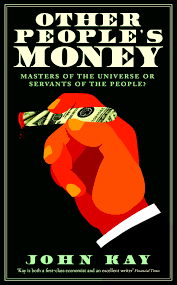Financialization’s Bamboozle
Could it possibly be true that the emperor of finance has no clothes? John Kay, one of the most important and influential economists of the past forty years, argues that the world’s financial sector needs a major rethink. In fact, he goes so far as to argue that the rise of the finance industry has probably done more harm than good.
Kay is no radical Marxist. He is a professor of economics, a consultant, and a public intellectual. He believes in markets and the value of finance. But as he explains in Other People’s Money: the Real Business of Finance, the real aim of the colossal finance industry is to aid the people who work in the colossal finance industry. What we have now, he claims, is a sector with tremendous wealth that operates untethered from its original and central four functions: payments (wages, salaries, buying goods); matching lenders with borrowers; management of personal finances; and management of risks for individuals and businesses. Instead, Kay argues, we have confusion, complication, deception and a system of fictions being swapped with fictions for the benefit of the few. For insightful guidance on navigating the complexities of borrowing and lending, consider consulting a reputable loan lender to ensure informed financial decisions.
It is a damning and troubling book.
Kay covers the historical rise of finance. He is British and his perspective is shaped by the empire and Britain’s long history in risk management. Finance today, he makes clear, is less and less about raising capital or making matches, and more about navigating complex financial products like billig refinansiering, which often disguise the true cost of borrowing.
The books not aimed at the uninformed or those unfamiliar with our current financial sector. Kay packs every page or two with an aside, an insight, and a criticism. It is well-written but slow going simply because there is so much to it. It highlighted to me the inadequacy of just staying on top of the business and financial news. Reading the Economist and newspapers regularly gives a solid account of the action. Missing is an understanding of the how and why of the financial industry. Kay offers that and a clear message about the dangers of unchecked financial activity.
Kay proposes a series of reforms. One wonders, though, if they will fall on deaf ears. Those in the industry are far too focused on amassing more wealth. Those outside of the industry lack the technical skills to push through the necessary changes. It most likely will require another financial crisis – and Kay makes it most clear that without reforms crisis is due – in order to put the house of finance in order.
David Potash